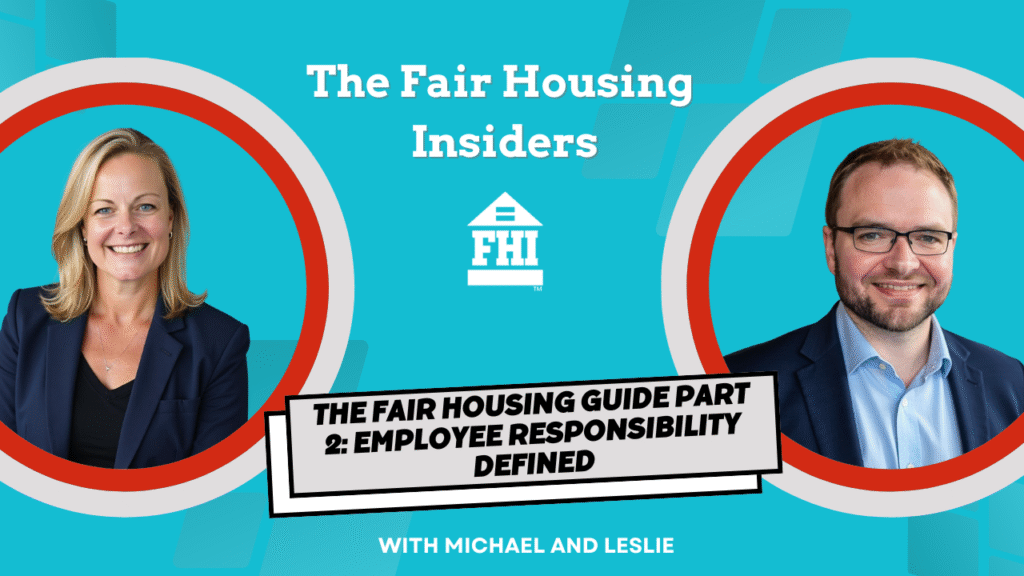In property management, fair housing compliance is more than a policy; it is a shared responsibility that extends to every employee. Whether you’re a leasing agent greeting prospective residents, a maintenance technician entering a home for repairs, or an office administrator handling paperwork, your actions can have legal consequences. The Fair Housing Act makes it clear: both companies and individual employees may be held accountable for violations. Understanding where that responsibility lies is essential to protecting yourself, your company, and the residents you serve.

Table of Contents
Individual Liability Under the Fair Housing Act
One of the most overlooked aspects of fair housing compliance is that employees themselves can be named in complaints and lawsuits. Courts have repeatedly reinforced that individuals are not shielded simply because they work for a company.
This can mean being identified in a HUD investigation, included in a civil lawsuit, or facing employment consequences. Importantly, intent is not the deciding factor. Even if an employee believes they are being friendly or helpful, if their words or actions have a discriminatory effect, they may have triggered a violation of the law. In fair housing, the impact often outweighs the intention.
Why Training Alone Isn’t Enough
Employers have a duty to provide comprehensive, accessible training. Training ensures employees understand their obligations, but it also demonstrates that the company has taken proactive steps to prevent violations. Still, a lack of training is not a shield for employees. Courts recognize that every employee is responsible for following the law, regardless of whether their employer has implemented effective compliance programs.
That said, training plays a dual role. It protects employers by reducing the risk of violations, while also empowering employees with the tools and confidence they need to make informed decisions on the job. Employees should never assume “this isn’t my responsibility.” If they don’t feel prepared or if a situation is unclear, they need to ask questions and seek guidance immediately.
Language Barriers and Communication Challenges
Property management teams often include staff members who are not fluent in English. While this diversity strengthens communities, it can also create compliance challenges. Unfortunately, the law does not make exceptions for misunderstandings caused by language differences. If an employee’s communication with a resident, even unintentionally, creates a discriminatory effect, liability still applies.
Employers should recognize this risk and ensure training and instructions are available in languages employees can fully understand. Clear communication reduces misunderstandings and builds stronger compliance. Employees, on their part, must take responsibility for asking for clarification and ensuring they fully grasp their role in providing fair housing protections.
Why This Matters for Everyone in Property Management
The reality is that fair housing compliance is not just about avoiding lawsuits; it’s about fostering trust and ensuring equal opportunity in housing. A single misstep, whether intentional or not, can damage reputations, impact residents’ lives, and lead to costly legal consequences.
For employees, this means taking ownership of their role in compliance. A friendly conversation with a resident, a quick response to a maintenance issue, or a casual remark during a property tour can all carry weight. For employers, it means fostering a culture of training, accountability, and open communication so that employees always feel prepared.
Building a Culture of Compliance
The most effective property management companies treat fair housing as part of their daily operations, not as an occasional training requirement. They provide annual refreshers, scenario-based learning, and open forums for employees to ask questions. Well-trained employees are less likely to make mistakes, more confident in their responsibilities, and better equipped to protect both residents and the company.
At the end of the day, fair housing is everyone’s responsibility. Employers must lead by providing strong training and resources. Employees must remain engaged, ask questions, and recognize that their words and actions have an impact. By working together, teams can reduce risk, support compliance, and create communities where all residents feel respected and welcomed.
You may also like:
- Preventing Staff Harassment in Property Management
- Fair Housing Liability: When Does Resident-on-Resident Harassment Trigger Management’s Duty to Act?
- Retaliation vs. Rule Enforcement: Navigating the Fair Housing Fine Line
- Top 3 Fair Housing Risks for Property Managers in 2026
- A Year of Upheaval: How 2025 Impacted Fair Housing Operations
